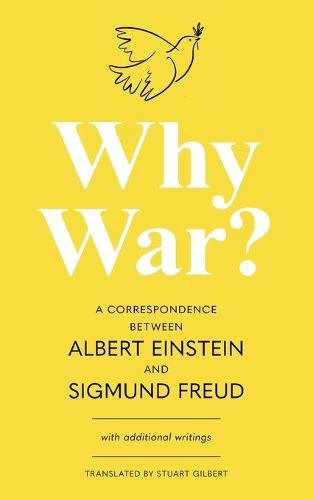Readings Newsletter
Become a Readings Member to make your shopping experience even easier.
Sign in or sign up for free!
You’re not far away from qualifying for FREE standard shipping within Australia
You’ve qualified for FREE standard shipping within Australia
The cart is loading…






This title is printed to order. This book may have been self-published. If so, we cannot guarantee the quality of the content. In the main most books will have gone through the editing process however some may not. We therefore suggest that you be aware of this before ordering this book. If in doubt check either the author or publisher’s details as we are unable to accept any returns unless they are faulty. Please contact us if you have any questions.
In 1932, Albert Einstein was invited by the League of Nations to address a letter on any subject to any individual. He chose to correspond with Sigmund Freud on avoiding war. Einstein maintained the importance of establishing an independent judiciary body to mediate conflicts. Freud agreed with this idea but also felt that "there is no likelihood of our being able to suppress humanity's aggressive tendencies." To this day, the correspondence on war by two of the greatest thinkers of all time proves prescient and remains indispensable.The correspondence between Einstein and Freud was originally published by The International Institute of Intellectual Cooperation of the League of Nations in 1933. Included in this edition is Freud's essay "Thoughts for the Times on War and Death," two pieces by Einstein on disarmament and the crisis facing affluent societies, and a biographical account of their original encounter and further exchanges.
$9.00 standard shipping within Australia
FREE standard shipping within Australia for orders over $100.00
Express & International shipping calculated at checkout
This title is printed to order. This book may have been self-published. If so, we cannot guarantee the quality of the content. In the main most books will have gone through the editing process however some may not. We therefore suggest that you be aware of this before ordering this book. If in doubt check either the author or publisher’s details as we are unable to accept any returns unless they are faulty. Please contact us if you have any questions.
In 1932, Albert Einstein was invited by the League of Nations to address a letter on any subject to any individual. He chose to correspond with Sigmund Freud on avoiding war. Einstein maintained the importance of establishing an independent judiciary body to mediate conflicts. Freud agreed with this idea but also felt that "there is no likelihood of our being able to suppress humanity's aggressive tendencies." To this day, the correspondence on war by two of the greatest thinkers of all time proves prescient and remains indispensable.The correspondence between Einstein and Freud was originally published by The International Institute of Intellectual Cooperation of the League of Nations in 1933. Included in this edition is Freud's essay "Thoughts for the Times on War and Death," two pieces by Einstein on disarmament and the crisis facing affluent societies, and a biographical account of their original encounter and further exchanges.